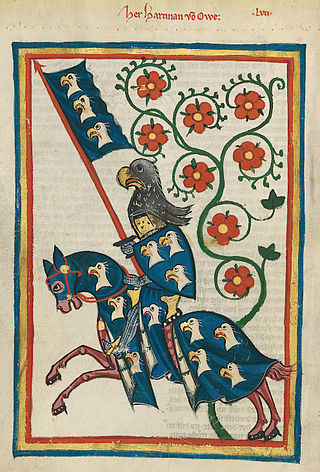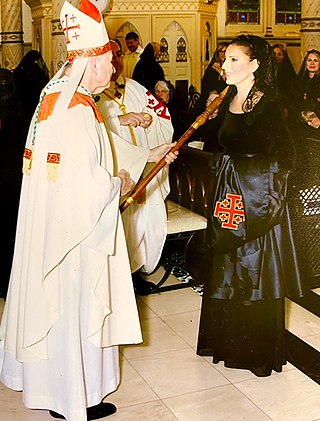Related Research Articles

A knight is a person granted an honorary title of knighthood by a head of state or representative for service to the monarch, the church or the country, especially in a military capacity.
In the United Kingdom and the British Overseas Territories, personal bravery, achievement, or service are rewarded with honours. The honours system consists of three types of award:

The Most Excellent Order of the British Empire is a British order of chivalry, rewarding contributions to the arts and sciences, work with charitable and welfare organizations, and public service outside the civil service. It was established on 4 June 1917 by King George V and comprises five classes across both civil and military divisions, the most senior two of which make the recipient either a knight if male or dame if female. There is also the related British Empire Medal, whose recipients are affiliated with, but not members of, the order.
Sir is a formal honorific address in English for men, derived from Sire in the High Middle Ages. Both are derived from the old French "Sieur" (Lord), brought to England by the French-speaking Normans, and which now exist in French only as part of "Monsieur", with the equivalent "My Lord" in English. Traditionally, as governed by law and custom, Sir is used for men who are knights and belong to certain orders of chivalry, as well as later applied to baronets and other offices. As the female equivalent for knighthood is damehood, the suo jure female equivalent term is typically Dame. The wife of a knight or baronet tends to be addressed as Lady, although a few exceptions and interchanges of these uses exist.
The order of precedence in the United Kingdom is the sequential hierarchy for Peers of the Realm, officers of state, senior members of the clergy, holders of the various Orders of Chivalry, and is mostly determined, but not limited to, birth order, place in the line of succession, or distance from the reigning monarch. The order of precedence can also be applied to other persons in the three legal jurisdictions within the United Kingdom:

The Most Distinguished Order of Saint Michael and Saint George is a British order of chivalry founded on 28 April 1818 by George, Prince of Wales, while he was acting as prince regent for his father, King George III. It is named in honour of two military saints, Michael and George.
The order of precedence in Scotland was fixed by Royal Warrant in 1905. Amendments were made by further Warrants in 1912, 1952, 1958, 1999 to coincide with the establishment of the Scottish Parliament and Scottish Government and most recently in 2012.

The title of Knight Bachelor is the basic rank granted to a man who has been knighted by the monarch but not inducted as a member of one of the organised orders of chivalry; it is a part of the British honours system. Knights Bachelor are the most ancient sort of British knight, but Knights Bachelor rank below knights of chivalric orders. A man who is knighted is formally addressed as "Sir [First Name] [Surname]" or "Sir [First Name]" and his wife as "Lady [Surname]".

Thomas George Baring, 1st Earl of Northbrook, was a British Liberal statesman. Gladstone appointed him Governor-General of India 1872–1876. His major accomplishments came as an energetic reformer who was dedicated to upgrading the quality of government in the British Raj. He reduced taxes and overcame bureaucratic obstacles in an effort to reduce both starvation and widespread social unrest. He served as First Lord of the Admiralty between 1880 and 1885.

A knight banneret, sometimes known simply as banneret, was a medieval knight who led a company of troops during time of war under his own banner and was eligible to bear supporters in English heraldry. The military rank of a knight banneret was higher than a knight Bachelor, but lower than an earl or duke.

The Royal Guelphic Order, sometimes referred to as the Hanoverian Guelphic Order, is a Hanoverian order of chivalry instituted on 28 April 1815 by the Prince Regent. It takes its name from the House of Guelph, of which the Hanoverians were a branch. Since Hanover and the United Kingdom shared a monarch until 1837, the order was frequently bestowed upon British subjects.

Dame is an honorific title and the feminine form of address for the honour of damehood in many Christian chivalric orders, as well as the British honours system and those of several other Commonwealth realms, such as Australia and New Zealand, with the masculine form of address being Sir. It is the female equivalent of a knighthood, which is traditionally granted to males. Dame is also a style used by baronetesses in their own right.
Commander, or Knight Commander, is a title of honor prevalent in chivalric orders and fraternal orders.
Events in the year 1876 in India.
Ceylonese recipients of British titles conferred on the advice of Her Majesty's Ceylon Ministers. This list includes all those who were born in, worked in or lived in Ceylon.
Sir Wilfrid Wentworth Woods was a British colonial financial administrator.
References
- ↑ "Knight Bachelor", Encyclopedia Britannica . Retrieved 5 April 2020.